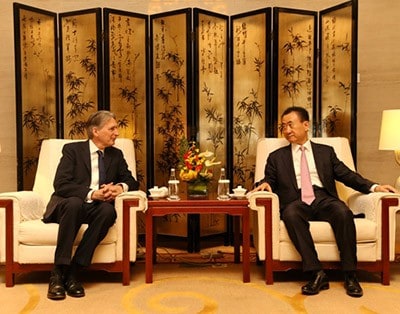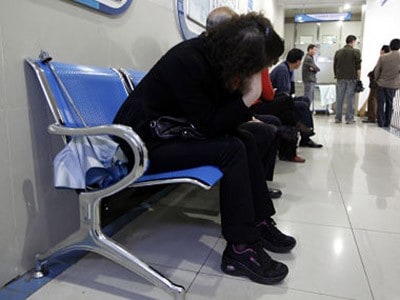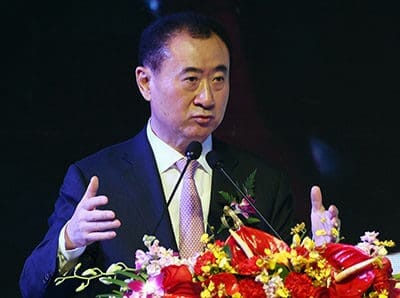
Wanda announced the JV soon after Wang met UK foreign secretary Philip Hammond
Dalian Wanda, the property conglomerate owned by China’s richest man, Wang Jianlin, has announced its latest new business line, a $2.3 billion joint venture to build private hospitals on the mainland.
In a statement issued following meetings between Wang and British Foreign Secretary Philip Hammond, Wanda said that, together with the UK’s International Hospitals Group (IHG), it would invest RMB 15 billion ($2.3 billion) to build a total of three new health care facilities in the cities of Shanghai, Qingdao and Chengdu.
The plan to build hospitals was announced within days of reports surfacing that Wanda would soon buy a majority stake in US film production firm Legendary Entertainment in a deal that would value the Hollywood shop at nearly $4 billion, and is part of an increasingly aggressive expansion for Wang’s company. In July of last year Wang already announced a plan to add two major new business lines to Wanda (not including hospitals) as part of a drive to build the company into a $200 billion concern.
By choosing to build hospitals, Wanda is following a path already chosen by a number of competing Chinese developers, as companies that grew rich building homes during China’s housing boom look for ways to maintain their profits as the market slows.
Adding a Hospital to a Theme Park

Inadequate health care has become a concern for many Chinese
Under the terms of a 10-year partnership agreement with IHG, the UK company will manage the three new hospitals, which be branded as “IHG Wanda” facilities. The plans call for a 1,000 bed project in Shanghai, which is slated to begin construction in the first quarter of this year. The Chengdu project is also expected to kick off before the end of March, according to the company.
The first of the new hospitals on the schedule, however, is to be included in Wanda’s combination theme park and movie studio project in Qingdao, with the company saying that the hospital component of the now entertainment, media and healthcare complex is already under construction and will be completed by August 2018.
Healthcare, which is still tightly controlled by China’s government and has had limited opportunities for foreign investment until recently, remains one of the mainland’s least developed industries, with government facilities commonly offering low standards of care and service.
The government has gradually been loosening its grip on the sector in recent years, and even granted official permission for wholly foreign owned hospitals in 2014.
Wang Enters a Sector That Fits His Expertise
By entering into a sector tightly controlled by Chinese authorities, with a large real estate component, Wang appears to have selected an industry where he can best deploy his existing advantages and expertise.
Wang’s ability to build his commercial real estate empire on the mainland has been due in no small part to his knack for gaining access to government controlled land and other resources, In a report published last year by the New York Times, and largely confirmed by Wang himself in an address at Harvard, reporters documented how Wang had brought on board a number of well-connected individuals as early stage investors in Wanda, including family members of senior government leaders.
The ability to work closely with government decision-makers could easily be a helpful factor as China feels its way through the early stages of a private health care industry.
Healthcare the Newest Element to Wanda’s Expansion

Wang promises that his 1,000-bed Shanghai hospital will be really big
Still, the announcement of the healthcare venture came as a surprise to many observers as Wanda has made a point of publicising its diversification away from the property sector over the last year.
At the company’s annual meeting in July last year, Wang emphasised the development of new business lines in finance and ecommerce, along with its property and cultural divisions, as being key to his goal of attaining a $200 billion market capitalisation by 2020.
However, despite the attention given to the glitzier worlds of money management and online shopping, of the milestones that Wanda has celebrated since December 1st, most of the company’s press releases still centre around real estate.
Among the 19 announcements made during the most recent 40 day period, of those which did not involve the company or its leadership receiving some award or other recognition, five concerned new mall openings (with Wanda’s 135th mainland mall having opened this month), one was for a new office tower, another was for a hotel, and there was also an announcement of the acquisition of a theatre chain in the US including 33 cinemas in 12 states.
Wanda is China’s Latest Developer to Pursue Hospitals
With Wanda continuing to focus its substantive expansion on real estate-related projects, it’s not surprising that the developer has turned to the private hospital sector, a path already chosen by some of its largest competitors.
In April of 2014 China Vanke chairman Wang Shi announced that his company, which is China’s largest developer by sales, was investing in hospitals in Shanghai, Guangzhou and Shenzhen. Evergrande Real Estate, which is also a top five developer, announced its own plans in February of that same year to cooperate with a hospital belonging to Harvard University to build health care facilities on the mainland.
McKinsey and Company has projected that health care spending in China will grow from $357 billion in 2011 to $1 trillion in 2020, making the industry a major investment target.
Leave a Reply